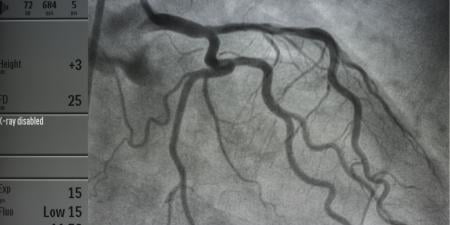A. Asking Mr. Douglas to restate the nature of his medical condition and explaining the role of lifestyle changes is preferable; it is supported by the first sentence of Opinion 8.08, "Informed Consent": "The patient's right of self-decision can be effectively exercised only if the patient possesses enough information to enable an intelligent choice." By asking Mr. Douglas to restate the nature of his medical condition, the physician can discover whether he has the appropriate information. Moreover, explaining in detail the effectiveness of lifestyle choices (eg, quitting smoking and regular exercise) for prevention of his condition versus treatment of his condition is supported by the same sentence of Opinion 8.08, "Informed Consent": "The patient's right of self-decision can be effectively exercised only if the patient possesses enough information to enable an intelligent choice." By explaining (or re-explaining) these differences in effectiveness, the physician ensures that Mr. Douglas has enough information to make an informed decision.
B. Telling Mr. Douglas that he will die without surgery should be avoided because it is not supported by the Code and may violate Opinion 8.08, "Informed Consent": "The physician's obligation is to present the medical facts accurately to the patient...and to make recommendations for management in accordance with good medical practice." While it is likely that Mr. Douglas will have a heart attack if he doesn't have surgery, it is not certain that he will die. Telling the patient he will die is an attempt to coerce him into accepting the physician's recommended treatment; this constitutes undesirable paternalistic behavior on the physician's part.
C. Suggesting that Mr. Douglas inform his wife of his condition so they can discuss his alternatives is an acceptable option not clearly addressed by the Code. This course of action may fall under Opinion 8.08, "Informed Consent", which states that the "physician has an ethical obligation to help the patient make choices from among the therapeutic alternatives consistent with good medical practice." By encouraging Mr. Douglas to involve his spouse in the decision-making process, the physician acknowledges the value of (usually helpful) input from family and other social relationships in important decisions.
D. Suggesting that Mr. Douglas obtain a second opinion is an acceptable alternative not clearly addressed by the Code. This course of action may fall under Opinion 8.08, "Informed Consent," which states that the "physician has an ethical obligation to help the patient make choices from among the therapeutic alternatives consistent with good medical practice." A second opinion will likely emphasize to Mr. Douglas the seriousness of his condition and may help him make a reasoned decision.



